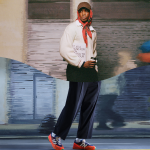
The tragic demise of the SoundCloud Generation
That of Juice WRLD is the last of a long series of death in the music industry. We asked ourselves why
December 12th, 2019
In August 2007, two Swedish musicians, Alexander Ljung and Eric Wahlforss, stationed in Berlin, created SoundCloud, the musical platform that helped shape the aesthetics associated with the American Musical Generation Z - for some - the biggest revolution music of recent years. Soundcloud Rap, that DIY rap subgenre made of lo-fi productions and characterized by a sound that did not exist before, spreads in fact in the United States, where it is used by the youngest to establish itself on the American music market, without passing brokerage of the music industry.
"Just because a musical style reaches widespread popularity does not mean that it is not built on a paper castle. The era of SoundCloud Rap - once full of promise - is over. When the worst happens, in fact, there is no data and successes that can be worth the fall."
Caramanica's is primarily an indictment of the music system that has squeezed and exploited the borderline attitude of these artists, promoting it for the realization of albums, concerts, clothing lines and an entire quasi-Trumblr aesthetic that has had a very easy grip on Generation Z. He didn't build a parachute that could contain the obvious fallout. As happened in the mid-1990s, when the East Coast-West Coast feud pulverized some of the most incredible talents in rap history just because the show-biz around that feud had gone further, SoundCloud Generation was unable to stop.
«If you haven't listened to these kids, you have almost certainly seen memes depicting them in your Instagram feeds, poking fun at their signature ad-libs (“Aye!”) and candy-colored hair. As they overtook rap, and rap overtook the industry writ large, these guffawing, sometimes Xanax-loving teens suddenly seemed less like a passing threat to mainstream norms and…well, more like the mainstream».
The change introduced by SoundCloud Generation is in fact first of all aesthetic and canonical: composed of members of Generation Z, the soundCloud era was the first to be born immersed in the culture of Internet and social, memes and Instagram. His young talents grew when rap was at the peak of its media exposure and when social networks had distorted reality to their liking, transforming the music industry, the relationship with mental illness with anxiety and solitude. On the digital cover of nss magazine, Jordan Anderson highlighted the connections between Generation Z and meme culture:
«Memes and similar forms of digital communities provide an open, though not always productive or healthy space to deal with depression and anxiety».
«The 6ix9ine identity, previously just provocative, was now radioactive. “Gummo” was released the same month the #MeToo movement emerged, and after decades of looking the other way, nobody, anywhere, was now willing to normalize a convicted underage sex abuser», Stephen Witt writes in Rolling Stone in January 2019.
In fact, in 2015 6ix9ine had already been convicted of sexually abusing a 13-year-old girl, while just in the first months of 2019 he was arrested and sentenced to 46 years in prison for crimes related to organized crime. To avoid a semi-life sentence, 6ix9ine began to cooperate with justice, becoming what in English is called a "snitcher", and, soon after, a meme. . “Know your meme” catalogues the 6ix9ine Snitch as « refers to a series of memes parodying rapper Daniel "6ix9ine" Hernandez exposing details on the Nine Trey Bloods gang, including his claims that rappers Jim Jones and Cardi B are gang members».
«Perhaps SoundCloud rap simply offers a voice to marginalised, disaffected American youth, and that it’s easy for marginalised, disaffected American youth to slip into criminality and violence. Almost too depressing to countenance is that these artists’ behaviour is instead inspired by a desire for notoriety».
«People are dying because there is pain in the world and not enough knowledge about mental health or tolerance or toxicology. People are going to jail because they lack opportunities and guidance. Treating the symptoms of disorder as the root causes is like prescribing cough medicine for a lung infection»
Trying not to simplify reality and to rediscover the causes of what can in all respects be called a human failure even in the structure of the music industry that should succeed in preserving the health of its artists, where the institutions and the societies have undoubtedly failed, but ended up erasing one of the most disruptive and generational phenomena that music had seen to be born in the new millennium.





































































